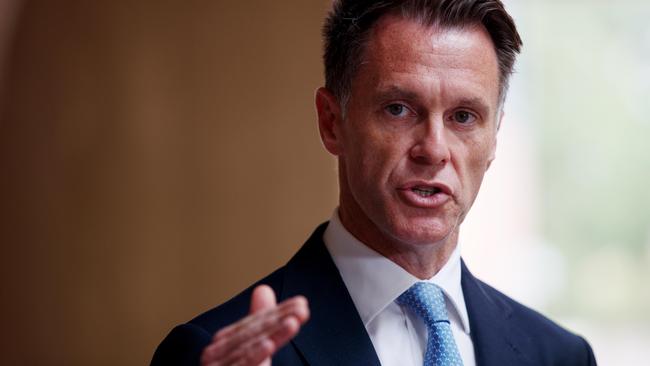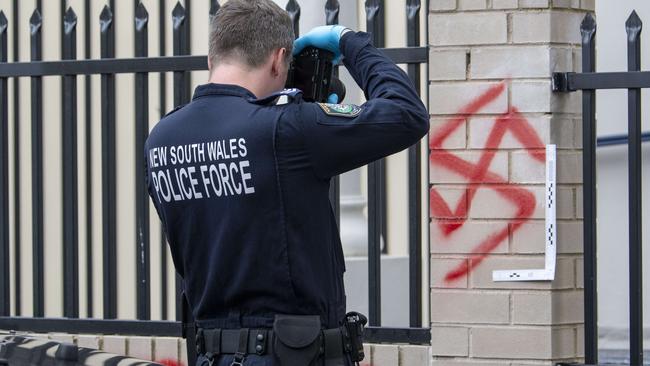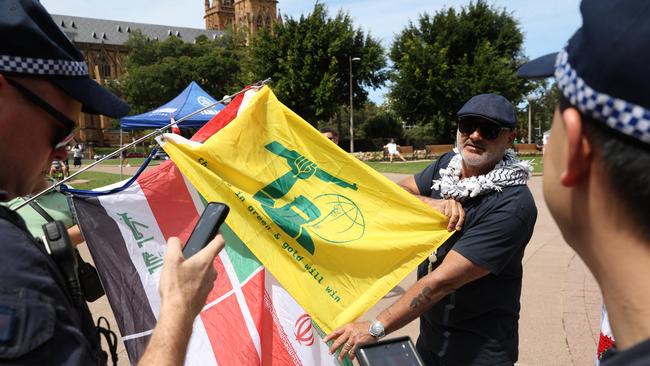Anti-Semitism reforms to turn page on NSW’s ‘shameful chapter, summer of hatred’
The NSW government has introduced reforms to end the state’s ‘shameful chapter’ after shocking anti-Semitic attacks, but the Liberals have gone further, proposing a terrorist flag clampdown and stronger penalties.

The NSW government has vowed to end a “shameful chapter” in the state’s history after a summer of “rolling hatred” and anti-Semitic attacks, tabling new proposed offences it hopes will deter and punish anti-Semites.
The state opposition, however, has said the reforms do not go far enough: proposing “harsher penalties” for displaying Nazi symbols, a minimum non-parole period for offenders, a ban on masks at protests, forcing “repeat” organisers to help cover policing costs, and a total terrorist flag clampdown – including those of near-similar likeness to official terror emblems.
“One public act of anti-Semitism is too many; a summer of rolling hatred is obviously intolerable,” NSW Premier Chris Minns said.
Introduced on Tuesday, enclosed in two bills, the government’s proposals include amendments to the Crimes Act to outlaw harassing, threatening or intentionally blocking people attending or leaving a place of worship, punishable with up to two years’ imprisonment.
The Minns government also would expand the definition of vandalism, making it a “public act” when such activity sought to incite violence – or included Nazi symbols – and introduce “hatred” as an aggravating factor in sentencing, alongside tougher sentences for vandalising Jewish centres with the Nazi symbol.
“(The laws would) send a message that if you’re going to get involved in this kind of bastardry the police will track you down – they will find you – and you will be punished,” Mr Minns said.

Reforms to criminalise “inciting racial hatred” were being finalised and would include a maximum two-year custodial sentence, complementing existing protections that outlawed “inciting or threatening violence” on protected minorities.
“So often what has begun as hate speech against the Jewish people has led to violence, it has led to persecution, it’s led to murder, and it’s led to genocide,” Mr Minns said.
The NSW Liberals, however, said they would go further, introducing a private member’s bill with its own proposals rather than seeking to amend the government’s, something it said it remained open to.
The opposition said it would criminalise the public usage of all terrorist symbols without “reasonable excuse” – a stronger drafting than similar legislation in the commonwealth code; increase the maximum penalty for displaying Nazi symbols to five years; ban “similar symbols” to those used by terror groups; and introduce an 18-month non-parole period for certain offenders.
The opposition also would give police more powers to refuse protests, empower them to bill “repeat organisers” and ban masks at rallies.
Mr Speakman said a Ned Kelly-esque Hezbollah flag pictured in Sydney last year would fall foul of its proposed laws.
“It could be something that tries to get around the law by having a symbol that is very close to, but not 100 per cent, the official emblem of a terrorist organisation… We’re trying to capture that,” he said.

Commonwealth provisions require police to prove the display of a terrorist symbol involved racial hatred, something the state opposition’s proposal wouldn’t require.
Mr Speakman said the government’s imminent bill to outlaw racial hatred “seemed reasonable” and “likely something (his party) support”, but would wait until he saw the legislation.
NSW Jewish Board of Deputies president David Ossip said the two leaders and their proposals showed “unwavering support” for his community, calling the government’s plans a “welcome step towards stamping out hate” and the Liberal bid to outlaw terrorist symbols and face-coverings at protests ”sensible and well-warranted”.
Elements of the reforms have met opposition, with the NSW Greens’ justice spokeswoman, Sue Higginson, saying the criminalisation of peaceful protest, even at or near places of worship, was an “overreach”.
“Police already have extraordinary powers to issue move orders to people on the street – these (new) laws would introduce more powers that are poorly defined and could cause peaceful protesters in Hyde Park, for example, to be arrested for the ‘crime’ of being near a church,” the Upper House member said.
That the government sought only to protect certain minorities under its proposed racial hatred laws has also been criticised.
Dowson Turco partner Nicholas Stewart – the Sydney-based company is an openly LGTBQIA law firm – criticised a lack of protections for that community, who had become more vulnerable to attacks amid a “normalisation” hatred.
“The proposed amendments rightly deal with anti-Semitism as racial hatred, but the omission of other minority groups that are subject to rampant hate and violent attacks frames their rights as inferior,” Mr Stewart said.
“In Sydney, members of (the LGBTQIA+) community are often the subject of homophobic, transphobic or queerphobic assaults. This underscores the need for all communities to be covered by the proposed amendments.”





To join the conversation, please log in. Don't have an account? Register
Join the conversation, you are commenting as Logout